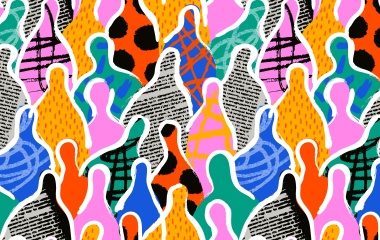
It is amazing how two people can look at the exact same thing and yet see things very differently. This is likely the reason that the Torah often requires two witnesses. In order to convict, the evidence must be so clear – we can call it beyond a reasonable doubt – that those who witness it are clearly seeing the same thing. Not only must the facts corroborate but so must the interpretation of these facts.
As we have previously noted (see here) the Torah is often purposely ambiguous, allowing and demanding multiple, even contradictory, interpretations. But even when there is no ambiguity and the verses are quite clear, what the Torah means to teach can be a matter of great debate.
Two examples of this phenomenon appear in this week’s parsha, Nasso (at least for those living outside Israel). “And he will atone for him for that he sinned by the soul” (Bamidbar 6:11). The Torah tells us that a Nazir, one who has vowed to abstain from all grape products, is to bring a sin offering at the conclusion of his Nazirite status. If one must bring a sin offering, then that means one has sinned. What the sin of the Nazir might be is a matter of great dispute.
Rabbi Elazar HaKappar argues that the fact the one becomes a Nazir in the first place is sinful. “And if one, who distressed himself by abstaining only from wine is called a sinner, one who distresses himself from each and every matter, all the more so is a sinner” (Taanit 11a). Rabbi Elazar argues the exact opposite. It is the act of ceasing to become a Nazir that requires atonement.
This is no argument about biblical interpretation but one reflecting two opposing world views. According to Rabbi Elazar HaKappar denying oneself permissible pleasures is sinful, in essence a rejection of G-d’s world. It is enough to abstain from that which the Torah prohibits, but that which is not prohibited we are enjoined to enjoy. That is why G-d created a world for us. On the other hand, Rabbi Elazar has a totally different understanding of Torah. “The Torah was not given to angels” and thus permits one to engage in many pleasures, pleasures that may cause one to be distracted from focusing on spiritual pursuits. Those who strive to be angelic, to greater spiritual heights understand the prohibitions of the Torah as a floor not a ceiling.
The Torah juxtaposes the laws of the Nazir and the tragic story of the Sotah, a woman who is accused by her husband - not without reason - of having had an affair. And here we encounter a debate on the lessons to be learned from one aspect of the Sotah – a debate that has had tremendous relevance and ramifications over the past 50 years. With the wife denying the accusation, the Torah provides a supernatural mechanism to determine her guilt – the only time the Torah allows us to “rely on miracles”. The accused is to drink a potion of water mixed with erased Biblical text and “if she had been defiled and was unfaithful to her husband, the curse bearing waters shall enter her to become bitter, and her belly will swell, and her thigh will rupture” (Bamidbar 5:27).
Despite the unequivocal words of the Torah, the Mishna teaches that if the woman is meritorious the impact of the waters will be delayed. “If she has merit, it delays: There is a merit that delays one year, there is merit that delays two years, and there is a merit that delays three years” (Mishna Sotah 3:3). Our Sages beautifully understood that one can be an angel and an animal – both at the same time. Just because one has committed adultery – one of the three cardinal sins of Judaism for which one is supposed to forfeit their life rather than transgress – does not mean that this same woman is not exemplary in many other areas.
What practical message this Mishnaic limitation of the Torah law should have is a matter of great dispute. “Ben Azzai states: A person is obligated to teach his daughter Torah, so that if she drinks [and does not die] know that merit delayed punishment for her.” It is imperative, Ben Azzai argues, to teach people that the Torah cannot be interpreted literally. If not, people may come to lose faith in Torah seeing it as untrue. On the other hand, Rabbi Eliezer argues that “Anyone who teaches his daughter Torah it is as if he is teaching her tiflut”, a word that is not easy to translate, but for our purposes promiscuity will do. By teaching that the warning of the Torah can be delayed and perhaps even averted, one may in fact be teaching people that they can get away with adultery. Ignorance truly is bliss even, perhaps especially, when it comes to mitzvot of the Torah.
Throughout the ages most authorities have sided with Rabbi Eliezer encouraging, perhaps obligating, women to remain ignorant[1]. Yet much has changed in the modern world. Beginning with German Orthodoxy’s insistence of education for men and women, to Sarah Schenirer's founding of Bais Yaakov (a result of her exposure to German Orthodoxy during the years of World War l), Rav Soloveitchik’s giving a Gemara shiur to the women at Stern College in 1977, to Rabbanit Chana Henkin’s Yoatzot Halacha program (founded 1999) to Midreshet Lindenbaum and Yeshivat Maharat (founded 2009) granting women Morot Hora’ah and Semicha respectively[2] - today we, BH, have many most learned women.
Perhaps in times where all knowledge was limited to the very few, the view of Rabbi Eliezer was the prudent approach. But in a world in which, thank G-d, knowledge has been democratized the idea of limiting knowledge based on one’s sex is liable to do more harm to Judaism that any tiflut could.
The Nazir and the Sotah – while for the most part no longer applicable – has tremendous application to our world today. What exactly that is, is a matter of great dispute. To frame these laws in somewhat broader terms, should one embrace the world around us trying to add much purity to our surroundings. or should one build walls in order to keep the impurity far away from us? Our Sages long ago recommended that one exposed to a Sotah is best served by withdrawing and becoming a Nazir. On the other hand, we can only fulfil our mission to be a light unto the nations (and to other Jews) if we engage with the world around us, even and especially, as it is filled with impurity. How to balance these two contradictory ideas is something we must work hard at.
[1] While the above statement requires much there is little doubt that until the modern period this was the near unanimous view, even if some authorities allowed some women to learn some (and in special circumstances, all) Torah.
[2] I imagine some might bristle at my lumping together of the above programs which reflect in many ways very different attitudes towards women and Torah study. And while some of the differences are deep and profound there is little doubt that there is a common thread uniting all of these programs. Yes, there is a slippery slope - and that can be (or might not be) a very good thing.



